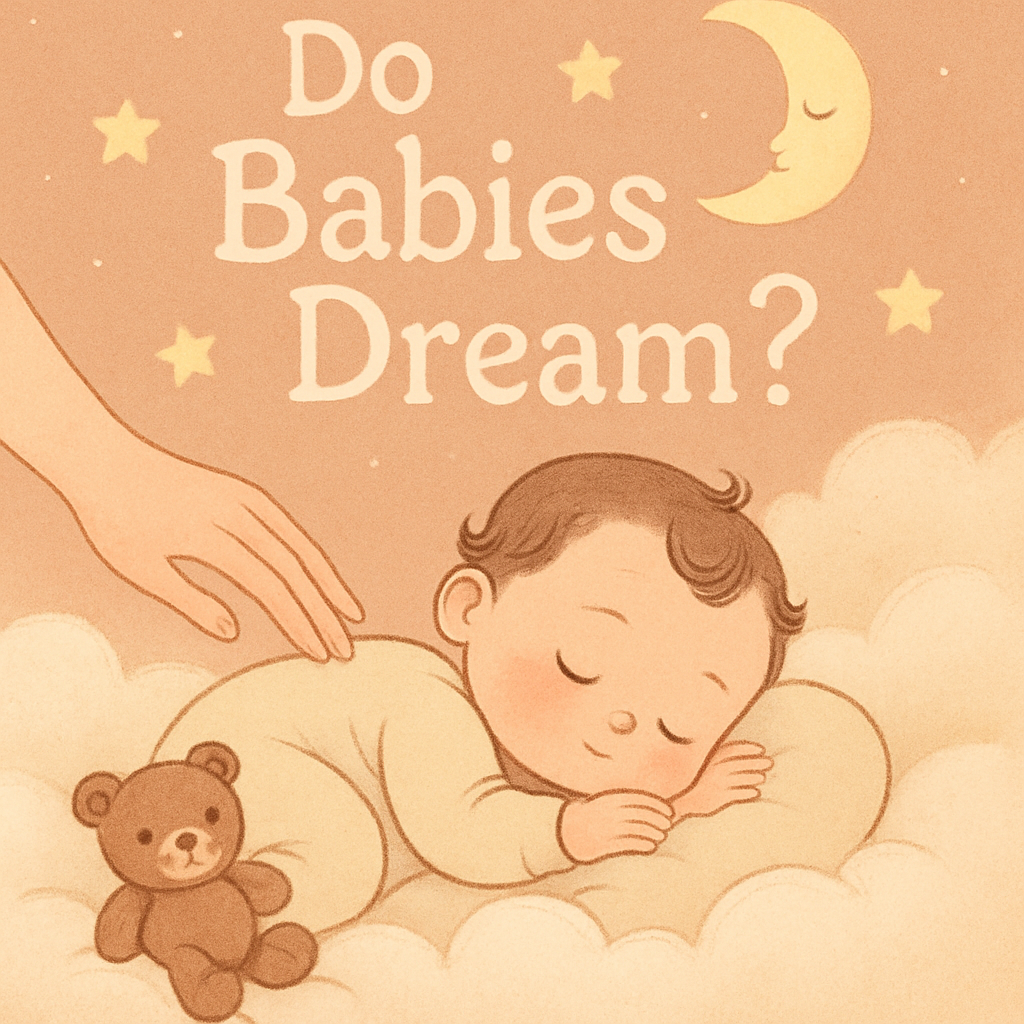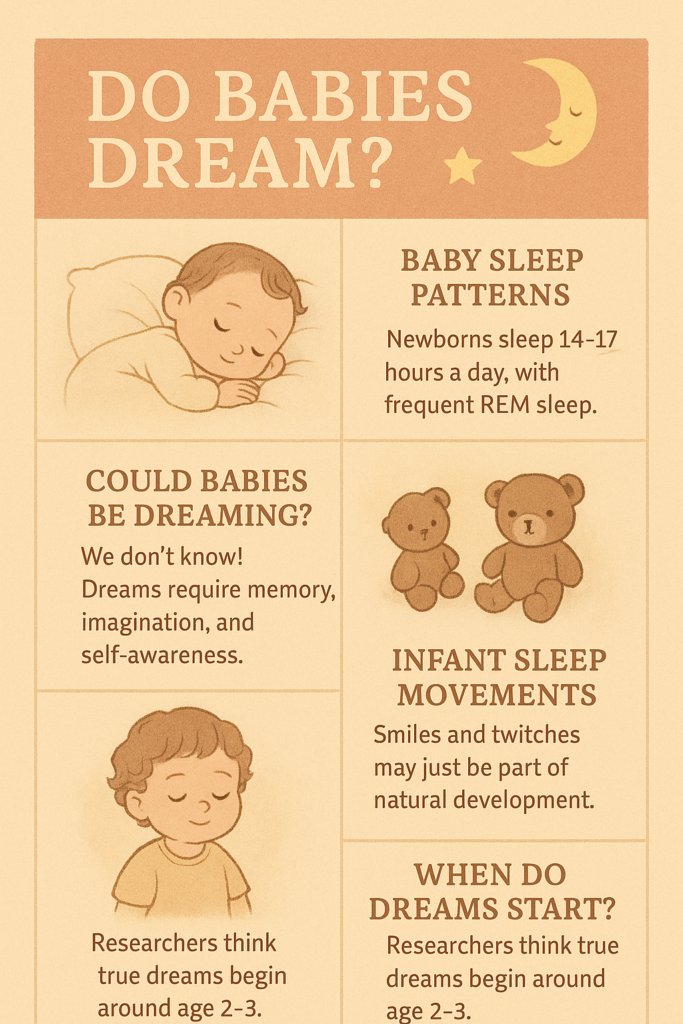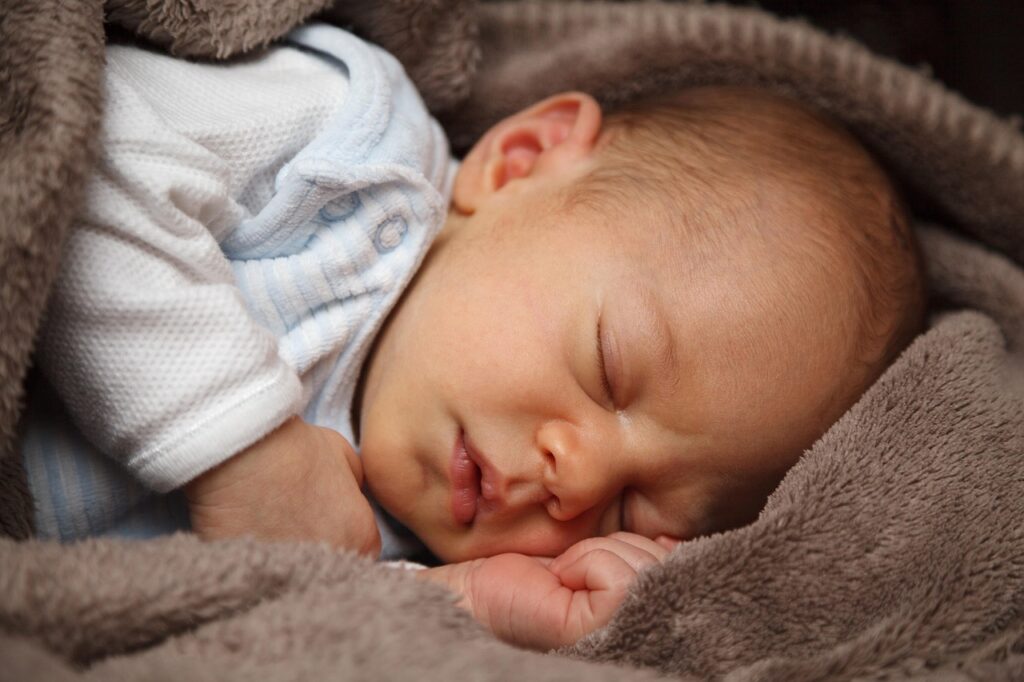A rather unique yet interesting question that would pop up every night to me was
DO BABIES DREAM?
My first born was a restless sleeper so with him I would never have imagined to dream even myself. Second born wasn’t a good sleeper as well. However my third born has been a really good sleep since birth. Even with my first born I could see him laughing frequently in his dreams and I would wonder if he is watching sweet dreams or what is making him laugh so much.
Those tiny etyelids fluttering, sudden smiles and occasional whispers, I would think what was going through those growing minds.
So, do babies dream? And if so, what could they possibly be dreaming about? Let’s explore what science says and what experts believe about the dreaming life of babies.

Understanding Baby Sleep Patterns
Undertsanding the question “how babies sleep?” is more important before proceeding to the concept of “do babies dream?”.
For this you need to understand the sleep patterns of babies.Newborns typically sleep between 14 to 17 hours a day, divided into short bursts. Unlike adults who move through sleep cycles in 90-minute phases, babies have shorter and more frequent sleep cycles—about 50 to 60 minutes.
Babies also spend a significant portion of their sleep in REM (Rapid Eye Movement) sleep. REM sleep is the stage in which adults tend to dream. This has led many scientists to assume that if REM sleep is where dreams occur, and babies spend about 50% of their sleep in REM, then do babies dream becomes a very relevant and intriguing question.
What Might Babies Dream About?
Ok, so this is probably the most common question that pops in our mind before we think do babies dream. I mean if babies dream than what do they dream about?
We all know that babies have limited experiences. At newborn stage they even have vivid image of their parents and siblings. So what do they dream about? They don’t have any school work, social interactions or even dramatic stories to dream about. All they are familiar with is warmth, comfort, sensations, hunger, a few toys and ofcourse the warmth and voice of their mothers.So if babies do dream, it’s likely not the kind of complex narrative dreams that older children or adults experience.
Experts believe that infant dreams, if they exist, are probably more like impressions than stories. They might “dream” in the form of feelings—comfort, connection, or perhaps discomfort like hunger or a wet diaper. But no one really knows for sure. That’s part of what makes do babies dream such a captivating question.
However if your baby is giving you tough time in sleeping than you need to try infant sleep books for parenting advice.

Science’s Point of Vew
Neurologists and developmental psychologists have weighed in on the do babies dream debate. While REM sleep in adults is strongly linked to dreaming, scientists are cautious about applying the same assumptions to infants.
One reason is that dreaming requires a certain level of cognitive development—memory, imagination, and self-awareness. These abilities don’t begin to fully develop until toddlers are closer to 2 or 3 years old. Therefore, many experts argue that do babies dream might not be a straightforward yes or no.
In fact, Harvard psychologist Dr. David Foulkes, a leading authority on children’s dreaming, suggests that do babies dream is unlikely to be answered with certainty. According to his research, dream recall and storytelling ability only emerge in later stages of childhood.
So Why Do Babies Twitch or Smile in Their Sleep?
If babies aren’t dreaming, then why do we often see them smile, grimace, or move around during sleep?
These movements, known as active sleep in infants, are completely normal. They may be part of the brain’s natural development process. Some researchers believe these actions help the baby’s nervous system mature. But it’s not clear if these behaviors are linked to dreams.
Still, parents observing these adorable moments often can’t help but ask again—do babies dream?
When Do Dreams Actually Begin?
If the answer to do babies dream is probably not in the early months, then when do dreams start?
Most studies suggest that dreaming begins around the age of 2 to 3 years, coinciding with the development of language and a sense of self. At this age, children begin to report their dreams—often simple and based on daily experiences, like playing or seeing animals.
Until then, do babies dream remains more of a philosophical and observational curiosity than a proven scientific fact.
My Two Cents
So the most honest answer to the question ” do babies dream?” is:
We don’t know for sure!
The way we understand babies do not have the mental framework to dream. Science also does not have any definitive answer to this question. However one thing that I am sure about is that watching your little bundle of joy sleeping peacefully is the most heartwarming experiences.Dreaming or not a good sleep is essential to healthy brain development and emotional well-being.
